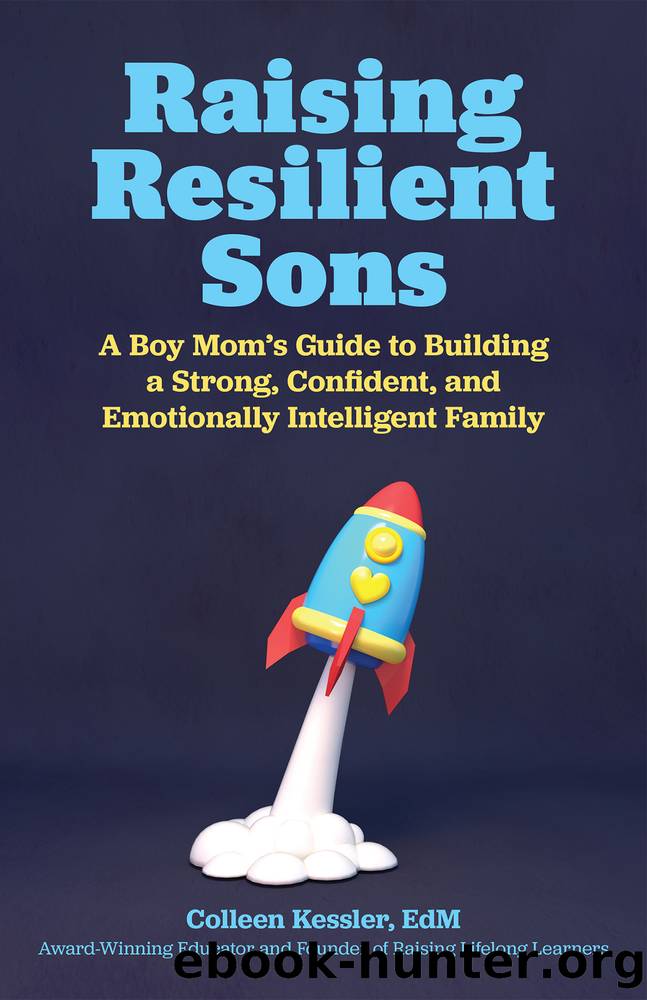Raising Resilient Sons by Colleen Kessler

Author:Colleen Kessler
Language: eng
Format: epub
Publisher: Ulysses Press
Published: 2020-12-08T00:00:00+00:00
Begin with Empathy
Forming any kind of lasting connection needs to start with empathy. Itâs critical in forming relationships with others. Itâs important to note what empathy isnât though. It isnât sympathy. Empathy isnât when we feel sorry for others. Empathy, at its core, is when we walk a mile in someone elseâs shoes. Have you heard that saying before? Itâs a good one to remember. Empathy is all about trying to feel what another person is feeling. Itâs about withholding judgment until youâve thought about it from the other personâs perspective. Empathy also doesnât mean understanding what another person is going through. The truth is that we may never completely understand, but we can try to grapple with what another person might be feeling. Itâs being able to say, âI canât imagine what that must have been like. Iâm so sorry,â and offering them that truth along with warmth and comfort.
When we model empathy by showing it to our sons, we let them know that their experiences and perspectives are important, and we show them firsthand how to act toward others to form lasting, real relationships. Too often we put expectations on our sons that are unfair. We treat them as extensions of ourselves or as little beings to be trained, and we canât imagine that they have real problems. We think, how can he be so upset about a misunderstanding with the neighbor kiddo? This doesnât compare to my pay cut at work. How can he be crying over a skinned elbow when his best friend is dealing with childhood cancer? I know that sometimes Iâm tempted to tell my sons to let it go or to just get over it because I get caught up in the busy.
But our sonsâ problems are just as real and valid as our own, and if weâre not modeling empathetic listening then theyâre not learning how to do it. If we fall into a pattern of minimizing their struggles, or worse, belittling and shaming them for feeling that way, we shut down their willingness to come to us for support.
Boys need to be seen and heardâon their terms and about their issues. Boyhood has plenty of challenges, and adults need to work to remember back to their own childhood with honesty and empathy toward the children they once were. Boys need empathy, but more than that, they need to see the adults in their lives project and model that empathy for them so that they can become caring adults. When they struggle to care and see things from anotherâs perspective, they grow into adults who struggle to form lasting relationships with others.
Showing empathy toward our sons provides them with both security and support. We essentially create a sort of safety net for them where they know theyâll be listened to and validated, and they also know they can get help. Theyâll share their struggles freely because they understand that they wonât be belittled or shamed. Theyâll seek our help when they make mistakes because they know we will support them without censure.
Download
This site does not store any files on its server. We only index and link to content provided by other sites. Please contact the content providers to delete copyright contents if any and email us, we'll remove relevant links or contents immediately.
The Lost Art of Listening by Michael P. Nichols(6458)
Rich Dad Poor Dad by Robert T. Kiyosaki(5137)
We Need to Talk by Celeste Headlee(4857)
I Love You But I Don't Trust You by Mira Kirshenbaum(3223)
The Complete Idiot's Guide to Coping With Difficult People by Arlene Uhl(2820)
Rich Dad Poor Dad: What The Rich Teach Their Kids About Money - That The Poor And Middle Class Do Not! by Robert T. Kiyosaki(2432)
Life Hacks by Dan Marshall(2151)
Dealing with People You Can't Stand by Dr. Rick Brinkman(2057)
A Burst of Light by Audre Lorde(1976)
An Odyssey by Daniel Mendelsohn(1917)
The Expectant Father by Armin A. Brott & Jennifer Ash(1891)
The Book You Wish Your Parents Had Read (and Your Children Will Be Glad That You Did) by Philippa Perry(1868)
Teach Your Child How to Think by Edward De Bono(1863)
The Out-of-Sync Child by Carol Stock Kranowitz(1772)
No Time to Say Goodbye(1754)
What I Need by J. Daniels(1718)
I Don't Belong to You by Keke Palmer(1661)
The Self-Driven Child by William Stixrud PhD & Ned Johnson(1658)
The 7 Habits Of Highly Effective Teens by Covey Sean(1627)
